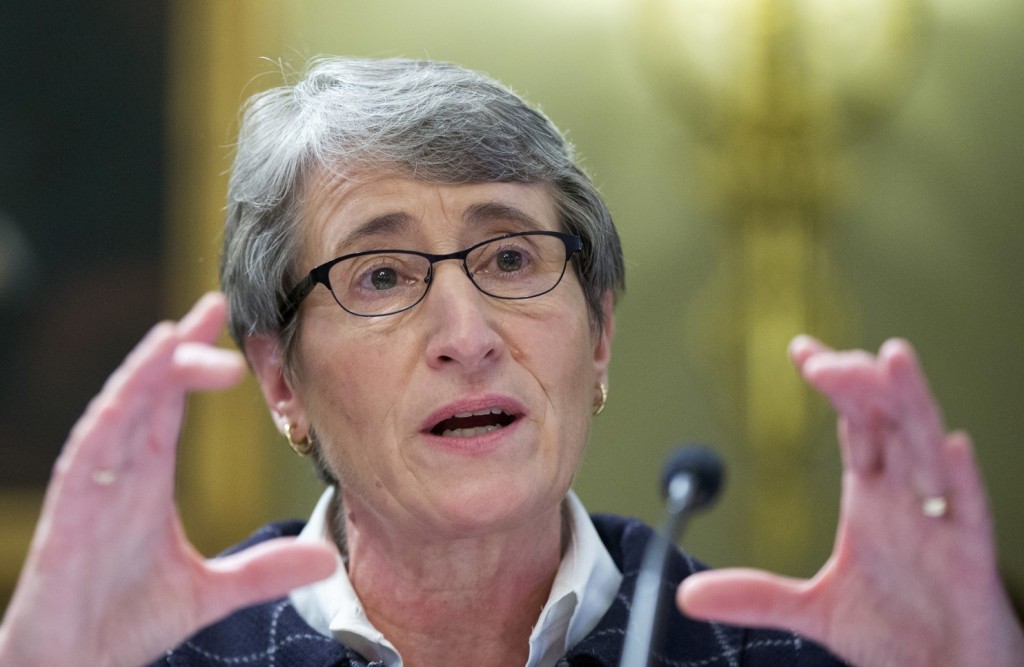By Darryl Fears

In a major reversal, the Obama administration says it will not allow oil drilling in the Atlantic Ocean. Interior Secretary Sally Jewell made the announcement via Twitter. (AP/Manuel Balce Ceneta)
In a major reversal, the Obama administration says it will not allow oil drilling in the Atlantic Ocean. Interior Secretary Sally Jewell made the announcement via Twitter. (AP/Manuel Balce Ceneta)
The Obama administration announced Tuesday that it is dropping its year-old plan to allow companies to search and drill for oil and natural gas in the Atlantic Ocean off of four southeastern states.
Department of Interior Sally Jewell said in a statement that objections from the Pentagon and strong opposition from nearly a hundred coastal communities in Virginia, North Carolina, South Carolina and Georgia factored into the decision to not offer leases to companies starting in 2017.
[The government’s Atlantic drilling plan takes friendly fire — from the Pentagon]
“We heard from many corners that now is not the time to offer oil and gas leasing off the Atlantic coast,” Jewell said. “When you factor in conflicts with national defense, economic activities such as fishing and tourism, and opposition from many local communities, it simply doesn’t make sense to move forward with any lease sales in the coming five years.”
There were added issues as well. The statement from the department, which received more than a million comments on its draft plan, listed commercial interests, current market dynamics and limited infrastructure as factors also driving the decision.
Other aspects of the president five-year energy plan, which has already undergone several rounds of public hearings, will move forward, such as a plan to offer 10 new leases in the Gulf of Mexico, one of the world’s most productive sources of oil Jewell said. Three leases will also be explored in the Alaskan Arctic.
According to Interior’s estimates, more than 3 billion barrels of oil is recoverable on the outer continental shelf, plus more than 30 trillion cubic feet of natural gas.
Virginia Gov. Terry McAuliffe (D) had expressed support for oil excavation as long as it was done responsibly, with the protection of the state’s lucrative beach tourism in mind. McAuliffe had little comment Tuesday, other than to say that Jewell’s announcement provides “an opportunity to work with the Department of Defense” to address its concerns moving forward.
CONTENT FROM SAMSUNG
Technology and health intersect for better care
A nation that combines innovation with responsive care and sound policy succeeds, and thrives.
U.S. Sen. Tim Kaine (D-Va.) said in a statement he has long felt that the ban on Atlantic drilling should be reconsidered. He said he was struck by the Pentagon’s objections because he’d never heard them previously, even when he was governor from 2006-2010. “The DoD has been relatively quiet during this public debate and has never shared their objections with me before.”
The military’s more recent objections to the Atlantic drilling plan appear to have carried significant weight. The Pentagon said Sunday that it drafted an assessment, at Jewell’s request, that identified “areas where the [Defense’s] offshore readiness activities are not compatible, partially compatible or minimally impacted by oil and gas activities,” spokesman Matthew Allen said in an email.
Officials also argued that oil exploration such as seismic testing and platforms could compromise training naval exercises “from unit level training to major joint service and fleet exercises.”
Reaction from oil industry advocates was immediate and negative. “The decision appeases extremists who seek to stop oil and natural gas production which would increase the cost of energy for American consumers and close the door for years to creating new jobs, new investments and boosting energy security,” said American Petroleum Institute President and Chief Executive Jack Gerard.
“This decision stunts the safe and responsible path to securing the domestic energy supplies future generations of Americans will need,” he said, adding that it ends a chance to create jobs for Americans along the Atlantic coast and nationwide, and “also erasing millions more in revenue to the government.”
Karen Harbert, president and CEO of the U.S. Chamber of Commerce Institute for 21st Century Energy, also lashed out. “America’s job creators have become accustomed to the relentless drumbeat of anti-energy policies from the Obama administration,” she said. But closing off the Atlantic coast to offshore drilling “is nevertheless remarkable for its catering to fringe constituencies at the expense of energy security and the American economy.”
Environmentalists, however, praised the administration. “We applaud the Obama administration for listening to the tens of thousands of citizens up and down the East Coast and protecting the Atlantic Ocean, safeguarding its beaches and coastal economies,” Sierra Club Executive Director Michael Brune said in a statement.
“This is an incredible day for the Southeast,” said Sierra Weaver, senior attorney for the Southern Environmental Law Center. “It represents the hard work of thousands of people and protects some of our most cherished places, from the Chesapeake Bay and the Outer Banks to the South Carolina Low country and Georgia barrier islands.”
The decision was the second rejection of a major project involving oil since the administration turned down the Keystone XL pipeline in November. Both actions are a nod in favor of environmentalists, who have been disappointed with some of President Obama’s energy initiatives during his two terms.
Like Obama’s decision on the Keystone pipeline, this one runs against public opinion. A Yale University survey last fall found 60 percent of Americans supporting expanded drilling for oil and natural gas off the U.S. coast. Fifty-seven percent of Democrats opposed expansion, while 62 percent of independents and 79 percent of Republicans supported it.
Coastal communities that supported the possibility of Atlantic drilling six years ago turned against it following the Deepwater Horizon oil spill in the Gulf of Mexico. The city of Virginia Beach abruptly reversed course when its council voted to rescind its 2010 resolution after some of the city’s biggest business alliances campaigned against drilling.
Scott Clement contributed to this report.
